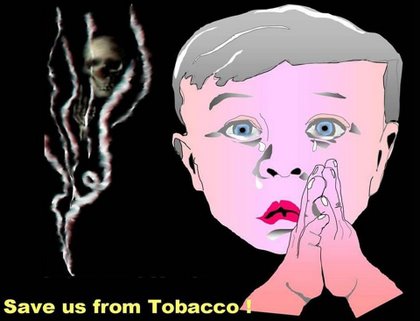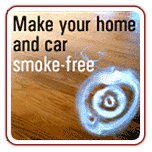
 December 9, 2010 - Children who breathe secondhand smoke (shs, passive smoking, environmental tobacco smoke, ets, involuntary smoking, sidestream smoke) are more likely to struggle with mental health problems, especially hyperactivity and "bad" behavior, according to the study, published in the Archives of Pediatrics and Adolescent Medicine.
December 9, 2010 - Children who breathe secondhand smoke (shs, passive smoking, environmental tobacco smoke, ets, involuntary smoking, sidestream smoke) are more likely to struggle with mental health problems, especially hyperactivity and "bad" behavior, according to the study, published in the Archives of Pediatrics and Adolescent Medicine.
PAPER: Objectively Measured Secondhand Smoke Exposure and Mental Health in Children
Evidence From the Scottish Health Survey, Mark Hamer, PhD; Tamsin Ford, PhD; Emmanuel Stamatakis, PhD; Samantha Dockray, PhD; G. David Batty, PhD, Arch Pediatr Adolesc Med. Published online December 6, 2010, ABSTRACT..
"We know that exposure to secondhand smoke is associated with a lot of physical health problems in children, although the mental health side has not been explored," Mark Hamer of University College London told Reuters Health in an e-mail.
In the United States, two of every three children between the ages of three and 11 are exposed to secondhand smoke. Meanwhile, one in five children aged nine to 17 have been diagnosed with some kind of mental or addictive disorder, according to the U.S. department of Health and Human Services.
Hamer and his colleagues studied 901 nonsmoking British children between the ages of 4 to 8, measuring levels of a byproduct of cigarette fumes in the childrens' saliva to gauge smoke exposure and having parents fill out a questionnaire about the childrens' emotional, behavioral and social problems. The more secondhand smoke a child took in, on average, the poorer their mental health -- particularly for hyperactivity and conduct disorder, or so-called "bad" behavior, the study said.
Overall, about three percent of all children received "abnormal" scores of 20 or more on the Strengths and Difficulties Questionnaire, a 40-point scale with the highest scores representing the poorest mental health.
Compared to the 101 children who breathed in the least secondhand smoke, the 361 with the most exposure scored an average of 44 percent higher on the questionnaire -- 9.2 versus 6.4. Children were most likely to breathe secondhand smoke in their own homes.
The gap remained after researchers accounted for other factors that could affect mental health such as asthma, physical activity and the families' income and housing situations, although they noted that some unmeasured factor also couldn't be ruled out.
Michael Weitzman at New York University Medical Center, who was not involved in the study, said the results strengthen the evidence that secondhand smoke, and possibly prenatal exposure to tobacco, causes mental health problems in children. "Many people now recognize that childrens' secondhand smoke exposure increases their risk for Sudden Infant Death Syndrome, ear infections and asthma," he told Reuters Health in an e-mail. "But secondhand smoke also poses a huge burden on the quality of life of children, their families and the larger society due to increased child mental health problems."
New Study - children are especially vulnerable to thirdhand smoke..
Reference: Secondhand smoke tied to childrens' poor mental health, Reporting by Lynne Peeples at Reuters Health; editing by Elaine Lies), Reuters, 12/8/2010.
Bringing the World of Tobacco Control closer together..
Secondhand Smoke Exposure and Mental Health in Children..
Subscribe to:
Post Comments (Atom)


To Provide Public Awareness
Purpose
About Us
Contact Us
2008 HIGHLIGHTS
TOPIX PAPERS - 2008 & 2009..
Archive
-
▼
2010 (1530)
-
▼
12/05 - 12/12 (24)
- Oregon - loophole in law - increasing number of k...
- Africa American cigarette smokers may increase ris...
- Phuket, Thailand - no smoking in crowded outside a...
- Kiev (Kyiv), Ukraine - January 1, 2011 restrict sm...
- Florida - tobacco cases clog dockets of courts..
- Canada - federal govt health minister, "not in bed...
- Secondhand Smoke Exposure and Mental Health in Chi...
- Bulgaria - health minister will work for implement...
- India - will delay for a year the use of scarier p...
- U.S. Surgeon General's Report: ' How Tobacco Smo...
- France - Smoking is more prevalent in French women...
- No more smoke breaks - Gulf of Mexico oil spill ...
- Alberta, Canada - family of anti-smoking activist...
- Canada - millions lost in revamping cigarettes gra...
- UST-Altria - family of smokeless tobacco user win...
- Baguio City, Philippines - “Hundred Percent Smoke-...
- Actor Michael Douglas - fighting for his life with...
- Federal Court of Appeals - e-cigarettes - rule...
- Powys County, Wales, UK - placing trash bins hopi...
- Lithuania - tax to increase January 1, 2011 on cig...
- South Africa - BAT funding awareness campaign to h...
- New South Wales (NSW), Australia - more bans com...
- Tobacco deadly in any form or disguise - graphic ...
- Philadelphia, PA - teen-smoking rate is among the...
-
▼
12/05 - 12/12 (24)
© Copyright Notice: The content of this website is for information education purposes only and any newsbrief may be used only as "fair use" for information/education purposes with permission of the authors and providing that original references and associated reference links are included in HTML format.
0 comments:
Post a Comment